Medicinal Cannabis
CANNABIS' THERAPEUTIC BENEFITS
The history of medical cannabis goes back to ancient times. For millennia, physicians in many parts of the world mixed cannabis into medicines to treat pain and other ailments. In the 19th century, cannabis was introduced for therapeutic use in Western Medicine. However, concern over the dangers of abuse led to the banning of the medicinal use of marijuana in most countries in the 1930s.
Only recently, cannabis' medicinal value is being reconsidered. In fact, we've seen significant advances in our understanding of cannabis's therapeutic benefits in a range of disorders, diseases, and cancers.
CANNABIS' THERAPEUTIC BENEFITS
The history of medical cannabis goes back to ancient times. For millennia, physicians in many parts of the world mixed cannabis into medicines to treat pain and other ailments. In the 19th century, cannabis was introduced for therapeutic use in Western Medicine. However, concern over the dangers of abuse led to the banning of the medicinal use of marijuana in most countries in the 1930s.
Only recently, cannabis' medicinal value is being reconsidered. In fact, we've seen significant advances in our understanding of cannabis's therapeutic benefits in a range of disorders, diseases, and cancers.
10 MOST COMMON CONDITIONS FORWHICH CANNABIS IS PRESCRIBED
Thanks to the growing body of research, support of medicinal cannabis has significantly increased over the past few years. Research shows cannabis may be able to treat or alleviate the symptoms of a variety of serious ailments.
Multiple sclerosis is a disease that affects the brain and spinal cord. Symptoms vary in type and severity, but typically include pain, spasms, balance issues, tingling, vision problems and more. Research published in the Multiple Sclerosis Journal found that cannabis based extracts can significantly reduce the spasticity and pain associated with multiple sclerosis while having few adverse effects on patients.
Spinal cord injuries (caused by trauma) are known to affect motor skills and can potentially lead to total loss function in some parts of the body. Research suggests cannabis can help patients treat the pain and muscle spasms often symptomatic of a spinal cord injury, with investigators from the Oxford Centre for Enablement noting that “Cannabis medicinal extracts can improve neurogenic symptoms unresponsive to standard treatments”.
Cancer is responsible for 25 percent of all deaths in the United States. While cannabis can’t cure cancer, it can drastically reduce the severity of symptoms and improve a patient’s quality of life. Research shows that both THC and CBD (two of the key active components found in cannabis) can stimulate appetite, which can help with weight loss, anorexia and cachexia which is common for many cancer patients. In addition, cannabis is very effective at combating the nausea caused by treatments such as chemotherapy.
The term ‘inflammatory bowel disease’ (IBD) describes disorders that result in inflammation of the digestive tract, including ulcerative colitis and Crohn’s disease. Research published in Digestion found that IBD patients experienced a variety of health benefits from using cannabis. Factors such as physical pain, social functioning, general health perception, ability to work and depression all saw notable improvement.
HIV/AIDS treatment has come a long way over the last decade. While modern therapy allows people with HIV/AIDS to live a longer, healthier life, the side effects of treatment can be challenging. A number of studies show medical cannabis can improve many symptoms, including anorexia, weight loss, severe nausea and more. For instance, a study published in the Journal of Pain and Symptom Management found 97 percent of HIV patients reported improved appetite with medical cannabis treatment, while 94 percent experienced reduced muscle pain and 93 percent reported improvements to both nausea and anxiety.
The term ‘spinal cord disease’ refers to any spinal cord issues that develop for reasons other than trauma. Multiple sclerosis, spina bifida, syringomyelia and spinal stenosis are considered examples of spinal cord disease. Patients living with a spinal cord disease may find therapeutic value in using cannabis based medicine because of its ability to alleviate spasticity and pain – two of the most common symptoms associated with spinal cord disease.
Research indicates that both THC and CBD dominant cannabis based medicines offer effective therapy for a range of sleep disorders, including insomnia when treated with the right strains. Cannabis is thought to reduce sleep latency, induce drowsiness and improve quality of sleep.
Epilepsy is a neurological condition that affects almost 3.4 million Americans. The disorder is characterized by seizures, which range from relatively mild (a moment of impaired concentration) to extreme (total loss of consciousness and awareness). Cannabis based medicines and CBD dominant products in particular, have proven to be very effective at reducing the frequency and severity of epileptic seizures. However, medical cannabis should only be used in treatment resistant cases of seizures.
Arthritis is an umbrella term that refers to the inflammation of a joint. There are more than 100 different types of arthritis, with some of the more common types including osteoarthritis, rheumatoid arthritis, and psoriatic arthritis. Symptoms include swelling and redness around the joint, reduced range of motion, stiffness, weakness, and severe, ongoing pain. In one study on the efficacy of cannabis as a form of pain relief for rheumatoid arthritis, researchers noted “a significant analgesic effect was observed and disease activity was significantly suppressed”.
Studies show medicinal cannabis may also be an effective treatment option in palliative care. Research published in Current Oncology found that medical cannabis could “provide further relief from distressing symptoms and spiritual suffering”, while improving patients’ overall quality of life.
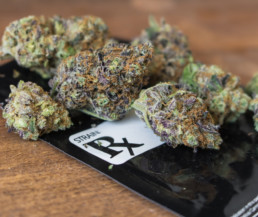
10 MOST COMMON CONDITIONS FORWHICH CANNABIS IS PRESCRIBED
Thanks to the growing body of research, support of medicinal cannabis has significantly increased over the past few years. Research shows cannabis may be able to treat or alleviate the symptoms of a variety of serious ailments.
Multiple sclerosis is a disease that affects the brain and spinal cord. Symptoms vary in type and severity, but typically include pain, spasms, balance issues, tingling, vision problems and more. Research published in the Multiple Sclerosis Journal found that cannabis based extracts can significantly reduce the spasticity and pain associated with multiple sclerosis while having few adverse effects on patients.
Spinal cord injuries (caused by trauma) are known to affect motor skills and can potentially lead to total loss function in some parts of the body. Research suggests cannabis can help patients treat the pain and muscle spasms often symptomatic of a spinal cord injury, with investigators from the Oxford Centre for Enablement noting that “Cannabis medicinal extracts can improve neurogenic symptoms unresponsive to standard treatments”.
Cancer is responsible for 25 percent of all deaths in the United States. While cannabis can’t cure cancer, it can drastically reduce the severity of symptoms and improve a patient’s quality of life. Research shows that both THC and CBD (two of the key active components found in cannabis) can stimulate appetite, which can help with weight loss, anorexia and cachexia which is common for many cancer patients. In addition, cannabis is very effective at combating the nausea caused by treatments such as chemotherapy.
The term ‘inflammatory bowel disease’ (IBD) describes disorders that result in inflammation of the digestive tract, including ulcerative colitis and Crohn’s disease. Research published in Digestion found that IBD patients experienced a variety of health benefits from using cannabis. Factors such as physical pain, social functioning, general health perception, ability to work and depression all saw notable improvement.
HIV/AIDS treatment has come a long way over the last decade. While modern therapy allows people with HIV/AIDS to live a longer, healthier life, the side effects of treatment can be challenging. A number of studies show medical cannabis can improve many symptoms, including anorexia, weight loss, severe nausea and more. For instance, a study published in the Journal of Pain and Symptom Management found 97 percent of HIV patients reported improved appetite with medical cannabis treatment, while 94 percent experienced reduced muscle pain and 93 percent reported improvements to both nausea and anxiety.
The term ‘spinal cord disease’ refers to any spinal cord issues that develop for reasons other than trauma. Multiple sclerosis, spina bifida, syringomyelia and spinal stenosis are considered examples of spinal cord disease. Patients living with a spinal cord disease may find therapeutic value in using cannabis based medicine because of its ability to alleviate spasticity and pain – two of the most common symptoms associated with spinal cord disease.
Research indicates that both THC and CBD dominant cannabis based medicines offer effective therapy for a range of sleep disorders, including insomnia when treated with the right strains. Cannabis is thought to reduce sleep latency, induce drowsiness and improve quality of sleep.
Epilepsy is a neurological condition that affects almost 3.4 million Americans. The disorder is characterized by seizures, which range from relatively mild (a moment of impaired concentration) to extreme (total loss of consciousness and awareness). Cannabis based medicines and CBD dominant products in particular, have proven to be very effective at reducing the frequency and severity of epileptic seizures. However, medical cannabis should only be used in treatment resistant cases of seizures.
Arthritis is an umbrella term that refers to the inflammation of a joint. There are more than 100 different types of arthritis, with some of the more common types including osteoarthritis, rheumatoid arthritis, and psoriatic arthritis. Symptoms include swelling and redness around the joint, reduced range of motion, stiffness, weakness, and severe, ongoing pain. In one study on the efficacy of cannabis as a form of pain relief for rheumatoid arthritis, researchers noted “a significant analgesic effect was observed and disease activity was significantly suppressed”.
Studies show medicinal cannabis may also be an effective treatment option in palliative care. Research published in Current Oncology found that medical cannabis could “provide further relief from distressing symptoms and spiritual suffering”, while improving patients’ overall quality of life.
MMJ QUALIFYING CONDITIONS
Although cannabis is federally illegal in the United States (for now), many states have legalized cannabis for medical purposes. But in order to qualify, patients must have a diagnosed ailment that is on their state’s list of qualifying conditions.Here is a list of each state and the qualifying medical conditions and symptoms. These conditions must be verified by a physician in order to get authorized as a valid medical marijuana patient. Please note that some states allow physicians to approve other medical conditions not listed on a case-by-case basis, so please check with your doctor.
(Qualifying conditions are subject to change. Please verify with your state)
MMJ QUALIFYING CONDITIONS
Although cannabis is federally illegal in the United States (for now), many states have legalized cannabis for medical purposes. But in order to qualify, patients must have a diagnosed ailment that is on their state’s list of qualifying conditions.Here is a list of each state and the qualifying medical conditions and symptoms. These conditions must be verified by a physician in order to get authorized as a valid medical marijuana patient. Please note that some states allow physicians to approve other medical conditions not listed on a case-by-case basis, so please check with your doctor.
(Qualifying conditions are subject to change. Please verify with your state)
Alabama
High-CBD forms of cannabis is only allowed for use in a state-sponsored clinical trial for treating:
Severe, debilitating epileptic conditions
Arkansas
Qualifying conditions for the Arkansas Medical Marijuana Amendment include:
Cancer Glaucoma HIV/AIDS Hepatitis C ALS or Lou Gehrig’s Disease Tourette’s Syndrome Crohn’s disease Ulcerative colitis Post-traumatic Stress Disorder (PTSD) Severe arthritis Fibromyalgia Alzheimer’s disease A chronic or debilitating disease that produces:
Cachexia or wasting syndrome Peripheral neuropathy Intractable pain Severe nausea Seizures, including those characteristic of epilepsy Severe or persistent muscle spasms, including those characteristic of multiple sclerosis
Connecticut
Qualifying conditions to become a medical marijuana patient in Connecticut include:
Cancer Glaucoma HIV/AIDS Parkinson’s disease Multiple sclerosis Damage to the nervous tissue of the spinal cord with objective neurological indication of intractable spasticity Epilepsy Cachexia (wasting syndrome) Wasting syndrome Crohn’s disease Post-traumatic stress disorder (PTSD) Sickle Cell Disease Post Laminectomy Syndrome with Chronic Radiculopathy Severe Psoriasis and Psoriatic Arthritis Amyotrophic Lateral Sclerosis Ulcerative colitis Complex Regional Pain Syndrome Cerebral palsy Cystic fibrosis Irreversible spinal cord injury with objective neurological indication of intractable spasticity Terminal illness requiring end of life care Uncontrolled intractable seizure disorder Hydrocephalus with intractable headaches Intractable migraines Trigeminal Neuralgia Intractable headache syndrome* Neuropathic facial pain* Fibromyalgia* Muscular dystrophy* Rheumatoid arthritis* For underage patients:
Cerebral Palsy Cystic fibrosis Irreversible spinal cord injury with objective neurological indication of intractable spasticity Severe epilepsy Terminal illness requiring end-of-life care Uncontrolled intractable seizure disorder
Alaska
Qualifying conditions to become a medical marijuana patient in Alaska include:
Cancer Glaucoma HIV/AIDS Any chronic or debilitating disease or treatment for such diseases, which produces:
Cachexia (wasting syndrome) Severe pain Severe nausea Seizures, including those that are characteristic of epilepsy Persistent muscle spasms, including those that are characteristic of multiple sclerosis
California
Qualifying conditions to become a medical marijuana patient in California include:
Cancer Anorexia AIDS Chronic pain Spasticity Cachexia Persistent muscle spasms, including those associated with multiple sclerosis Seizures, including, but not limited to, those associated with epilepsy Severe nausea Glaucoma Arthritis Migraines Any other chronic or persistent medical symptom that substantially limits the ability of the person to conduct one or more major life activities (as defined by the Americans with Disabilities Act of 1990) or, if not alleviated, may cause serious harm to the patient’s safety or physical or mental health
Delaware
Qualifying conditions to become a medical marijuana patient in Delaware include:
Terminal illness Cancer HIV/AIDS Decompensated cirrhosis Hepatitis C Lou Gehrig’s disease (amyotrophic lateral sclerosis, or ALS) Alzheimer’s disease Post-traumatic stress disorder (PTSD)*Must be certified by a licensed psychiatrist Intractable epilepsy Autism with self-injurious or aggressive behavior A chronic or debilitating disease or medical condition that produces one or more of the following:
Cachexia (wasting syndrome) Severe, debilitating pain that has not responded to prescribed medication in 3 months Intractable nausea Seizures
Severe or persistent muscle spasms, including those characteristic of multiple sclerosis Pediatric Patients Qualifying Conditions*:
*If the qualifying patient is younger than 18 years of age, the physician must be a pediatric neurologist, pediatric gastroenterologist, pediatric oncologist or pediatric palliative care specialist.
Intractable epilepsy A chronic or debilitating disease or medical condition where they have failed treatment involving one or more of the following symptoms:
Cachexia (wasting syndrome) Intractable nausea Severe, painful and persistent muscle spasms
Arizona
Qualifying conditions to become a medical marijuana patient in Arizona include:
Cancer Glaucoma HIV/AIDS Hepatitis C Amyotrophic lateral sclerosis Crohn’s disease Alzheimer’s disease A chronic or debilitating condition or its treatment that produces one or more of the following:
Cachexia (wasting syndrome) Severe and chronic pain Severe nausea Seizures, including those characteristic of epilepsy Severe or persistent muscle spasms, including those characteristic of multiple sclerosis Post-traumatic stress disorder
Colorado
Qualifying conditions to become a medical marijuana patient in Colorado include:
Cancer Glaucoma HIV/AIDS Post-traumatic Stress Disorder (PTSD) If the patient has a chronic or debilitating disease or medical condition that produces one or more of the following:
Cachexia (wasting syndrome) Persistent muscle spasms Seizures Severe nausea Severe pain
District of Columbia (Washington D.C.)
Qualifying conditions to become a medical marijuana patient in Washington, D.C. include:
HIV/AIDS Cancer Glaucoma Severe or peristent muscle spasms, including those characteristic of multiple sclerosis Any other condition that is chronic, cannot be effectively treated by ordinary medical measures, or, Any condition for which treatment with medical marijuana would be beneficial, as determined by the patient’s physician
Florida
Qualifying conditions to become a medical marijuana patient in Florida include:
Cancer Epilepsy Glaucoma HIV/AIDS Post-traumatic stress disorder (PTSD) ALS or Lou Gehrig’s disease Crohn’s disease Chronic seizures Parkinson’s disease Multiple sclerosis Medical conditions of the same kind or class as or comparable to those listed above A terminal condition diagnosed by a physician other than the qualified physician issuing the certification Chronic nonmalignant pain
Illinois
Qualifying conditions to become a medical marijuana patient in Illinois include:
Acquired Immunodeficiency Syndrome (AIDS) Alzheimer’s disease Lou Gehrig’s disease (ALS) Arnold-Chiari malformation and syringomyelia Cachexia/wasting syndrome Cancer Causalgia Chronic inflammatory demyelinating polyneuropathy Crohn’s disease CRPS (Complex Regional Pain Syndrome Type I) CRPS (Complex Regional Pain Syndrome Type II) Dystonia Fibromyalgia (severe) Fibrous dysplasia Glaucoma Hepatitis C Human Immunodeficiency Virus (HIV) Hydrocephalus Hydromyelia Interstitial cystitis Lupus Multiple sclerosis Muscular dystrophy Myasthenia gravis Myoclonus Nail-patella syndrome Neurofibromatosis Parkinson’s disease Post-concussion syndrome Post-Traumatic Stress Disorder (PTSD) Reflex sympathetic dystrophy Residual limb pain Rheumatoid arthritis (RA) Seizures (including those characteristic of epilepsy) Sjogren’s syndrome Spinal cord disease (including but not limited to arachnoiditis, Tarlov cysts, hydromyelia & syringomelia) Spinal cord injury with objective neurological indication of intractable spasticity Spinocerebellar ataxia (SCA) Syringomyelia Tarlov cysts Tourette syndrome Traumatic brain injury (TBI)
Georgia
Georgia only allows for the use of low THC oil (less than 5% THC by weight).Qualifying conditions to become a medical marijuana patient in Georgia include:
Cancer (end-stage) Lou Gehrig’s disease (ALS) (severe or end-stage) Seizure disorders related to diagnosis of epilepsy or trauma-related head injuries Severe multiple sclerosis Crohn’s disease Mitochondrial disease Severe Parkinson’s disease Severe sickle cell disease
Indiana
Indiana provides civil immunity for a health care provider if the patient who possesses the cannabidiol is a part of a clinical trial. Conditions include:
Epilepsy Lennox-Gestaut syndrome Dravet syndrome Other seizure disorders
Kentucky
Kentucky allows for the use of low-THC cannabis or industrial hemp-derived CBD oil. Only those who are participating in a clinical trial or expanded access program are legally allowed to possess CBD oil.
Louisiana
Qualifying conditions to become a medical marijuana patient in Louisiana include:
Symptoms related to cancer Glaucoma Spastic quadriplegia
Hawaii
Qualifying conditions to become a medical marijuana patient in Hawaii include:
Cancer Chronic pain Crohn’s disease Epilepsy Glaucoma HIV/AIDS Lupus Multiple sclerosis Post-traumatic stress disorder Rheumatoid arthritis A chronic or debilitating disease or medical condition that produces one or more of the following:
Cachexia (wasting syndrome) Severe pain Severe nausea Seizures, including those characteristic of epilepsy Severe and persistent muscle spasms, including those characteristic of multiple sclerosis or Crohn’s disease.
Iowa
Iowa allows for the use of high-CBD cannabis extracts with less than .3% THC.Qualifying conditions to become a medical marijuana patient in Iowa include:
Intractable epilepsy
Maryland
Qualifying conditions to become a medical marijuana patient in Maryland include:
Cachexia Anorexia Wasting syndrome Severe chronic pain Severe nausea Seizures, including those characteristic of epilepsy Severe and persistent muscle spasms Glaucoma Post-traumatic stress disorder (PTSD) Chronic pain
Mississippi
Mississippi allows access to CBD oil only. Qualifying conditions to become a medical marijuana patient in Mississippi include:
Debilitating epileptic seizure disorders
Montana
Qualifying conditions to become a medical marijuana patient in Montana include:
Cancer Glaucoma HIV/AIDS Cachexia (wasting syndrome) Severe or chronic pain Intractable nausea or vomiting Epilepsy or an intractable seizure disorder Multiple sclerosis Crohn’s disease Painful peripheral neuropathy A central nervous system disorder resulting in chronic, painful spasticity or muscle spasms Admittance into hospice care Post-traumatic stress disorder (PTSD)
New Jersey
Qualifying conditions to become a medical marijuana patient in New Jersey include:
Lou Gehrig’s disease (amyotrophic lateral sclerosis, or ALS) Multiple sclerosis Terminal cancer Muscular dystrophy Inflammatory bowel disease (IBD) Crohn’s disease Terminal illness if the physician has determined a prognosis of less than 12 months of life Seizure disorder, including epilepsy Intractable skeletal muscular spasticity Glaucoma Post-traumatic stress disorder (PTSD) HIV/AIDS Cancer Anxiety* Migraines* Tourette’s Syndrome* Chronic pain related to musculoskeletal disorders* Chronic pain of visceral origin (related to internal organs)* *Currently awaiting final decision from NJ Health Commissioner Cathleen Bennett
North Carolina
North Carolina allows for the use of CBD oil only. Qualifying conditions to become a medical marijuana patient in North Carolina include:
Intractable epilepsy
Massachusetts
Qualifying conditions to become a medical marijuana patient in Massachusetts include:
Cancer Glaucoma HIV/AIDS Hepatitis C Lou Gehrig’s disease (ALS) Crohn’s disease Parkinson’s disease Multiple sclerosis Other debilitating conditions as determined in writing by a qualifying patient’s certifying physician.
Minnesota
Minnesota does not allow for smokeable cannabis, only a 30-day supply of oils, edibles, and concentrates. Qualifying conditions to become a medical marijuana patient in Minnesota include:
Cancer associated with chronic pain, nausea/severe vomiting, wasting Cachexia (wasting syndrome) Glaucoma HIV/AIDS Lou Gehrig’s disease (Amyotrophic lateral sclerosis, or ALS) Tourette syndrome Seizures, including those characteristic of epilepsy Inflammatory bowel disease, including Crohn’s disease Severe and persistent muscle spasms Terminal illness with life expectancy of less than one year Intractable pain* Post-traumatic stress disorder (PTSD)
New Hampshire
Qualifying conditions to become a medical marijuana patient in New Hampshire include:
Cancer Ehler’s Danlos Syndrome Glaucoma HIV/AIDS Hepatitis C Amyotrophic lateral sclerosis (ALS) Muscular dystrophy Crohn’s disease Multiple sclerosis Chronic pancreatitis Spinal cord injury or disease Traumatic brain injury Epilepsy Lupus Parkinson’s disease Alzheimer’s disease Ulcerative colitis Post-traumatic stress disorder (PTSD) A severely debilitating or terminal medical condition that produces one or more of the following:
Elevated intraocular pressure Cachexia (wasting syndrome) Severe pain Severe nausea/vomiting Seizures Severe, persistent muscle spasms
Maine
Qualifying conditions to become a medical marijuana patient in Maine include:
Cancer Glaucoma HIV/AIDS Hepatitis C Lou Gehrig’s disease (ALS) Crohn’s disease Alzheimer’s disease Post-traumatic stress disorder (PTSD) Nail-patella syndrome A chronic or debilitating disease or medical condition that produces one or more of the following:
Cachexia (wasting syndrome) Severe nausea Seizures, including those characteristic of epilepsy Severe muscle spasms (including multiple sclerosis and other diseases causing severe and persistent muscle spasms)
Michigan
Qualifying conditions to become a medical marijuana patient in Michigan include:
Cancer Glaucoma HIV/AIDS Hepatitis C Lou Gehrig’s disease (Amyotrophic lateral sclerosis, or ALS) Crohn’s disease Alzheimer’s disease Nail-patella syndrome Post-traumatic stress disorder (PTSD) A chronic or debilitating disease or medical condition that produces one or more of the following:
Cachexia (wasting disease) Severe and chronic pain Severe nausea Seizures, including those characteristic of epilepsy
Severe or persistent muscle spasms, including those characteristic of multiple sclerosis
Missouri
Missouri legalized medical marijuana with the passage of Amendment 2 in Nov. 2018. That measure set out these qualifying conditions:
Cancer Epilepsy Glaucoma Intractable migraines Conditions that cause persistent pain or muscle spasms, including MS, Parkinson’s disease, and Tourette’s syndrome. Debilitating psychiatric disorders such as PTSD HIV or AIDS A chronic medical condition normally treated with prescription medication that can lead to dependence, when a physician determines that medical marijuana could be an effective and safer treatment. (This is most commonly used with regard to prescription opioids.) Any terminal illness Hepatitis C ALS Inflammatory bowel disease Crohn’s disease Huntington’s disease Autism Neuropathies Sickle cell anemia Alzheimer’s disease Cachexia Wasting disease Any other chronic or debilitating medical condition that, in the professional judgment of a physician, might be helped by the use of medical cannabis.
South Carolina allows for the use of CBD oil only. Qualifying conditions to become a medical marijuana patient in South Carolina include:
Certain forms of epilepsy as part of a state-run clinical trial
Oklahoma
Oklahoma allows for the use of CBD oil only. Qualifying conditions to become a medical marijuana patient in Oklahoma include:
Must be under the age of 18 suffering from:
Lennox-Gastaut syndrome Dravet syndrome Severe myoclonic epilepsy of infancy Any form of refractory epilepsy not treatable by traditional medical therapies
Rhode Island
Qualifying conditions to become a medical marijuana patient in Rhode Island include:
Cancer Glaucoma HIV/AIDS Hepatitis C A chronic or debilitating disease or medical condition that produces one or more of the following:
Cachexia (wasting syndrome) Chronic pain Severe nausea Seizures, including but not limited to those characteristic of epilepsy Severe and persistent muscle spasms, including but not limited to those characteristic of multiple sclerosis or Crohn’s disease Alzheimer’s disease
Oregon
Qualifying conditions to become a medical marijuana patient in Oregon include:
Cancer Glaucoma A degenerative or pervasive neurological condition HIV/AIDS A medical conditions that produces one or more of the following:
Cachexia (wasting syndrome) Severe pain Severe nausea Seizures, including but not limited to seizures caused by epilepsy Persistent muscle spasms, including but not limited to those caused by multiple sclerosis Post-traumatic stress disorder (PTSD)
Pennsylvania
Qualifying conditions to become a medical marijuana patient in Pennsylvania include:
Amyotrophic Lateral Sclerosis (ALS) Autism Cancer Crohn’s disease Damage to the nervous tissue of the spinal cord with objective neurological indication of intractable spasticity Epilepsy Glaucoma HIV/AIDS Huntington’s disease Inflammatory bowel disease (IBD) Intractable seizures Multiple sclerosis Neuropathies Parkinson’s Disease Post-traumatic stress disorder (PTSD) Severe, chronic or intractable pain of neuropathic origin or severe chronic or intractable pain in which conventional therapeutic intervention and opiate therapy is contraindicated or ineffective Sickle cell anemia
New Mexico
Qualifying conditions to become a medical marijuana patient in New Mexico include:
Lou Gehrig’s disease (amyotrophic lateral sclerosis, or ALS) Cancer Crohn’s disease Epilepsy Glaucoma Hepatitis C infection currently receiving antiviral treatment HIV/AIDS Huntington’s Disease Hospice care Inclusion Body Myositis Inflammatory autoimmune-mediated arthritis Intractable nausea/vomiting Multiple sclerosis Damage to the nervous tissue of the spinal cord with intractable spasticity Painful peripheral neuropathy Parkinson’s disease Post-traumatic stress disorder (PTSD) Severe chronic pain Severe anorexia Cachexia (wasting syndrome) Spasmodic Torticollo (cervical dystonia) Ulcerative colitis
North Dakota
North Dakota’s qualifying conditions for the North Dakota Compassionate Care Act include:
Cancer and its treatments HIV/AIDS Hepatitis C (decompensated cirrhosis) ALS or Lou Gehrig’s disease Post-traumatic stress disorder (PTSD)*must be diagnosed by a licensed psychiatrist Alzheimer’s disease, dementia, or treatment of these conditions Crohn’s disease Fibromyalgia Spinal stenosis Chronic back pain, including:
Neuropathy or damage to the nervous tissue of the spinal cord with objective neurological indication of intractable spasticity Glaucoma Epilepsy A chronic or debilitating disease, medical condition, or its treatment that produces one or more of the following:
Cachexia or wasting syndrome Severe, debilitating pain that has not responded to previously prescribed medication or surgical measures for more than three months or for which other treatment options produced serious side effects Intractable nausea Seizures Severe or persistent muscle spasms, including but not limited to those characteristic of multiple sclerosis.
South Carolina
South Carolina allows for the use of CBD oil only. Qualifying conditions to become a medical marijuana patient in South Carolina include:
Certain forms of epilepsy as part of a state-run clinical trial
Nevada
Qualifying conditions to become a medical marijuana patient in Nevada include:
AIDS Cancer Glaucoma Post-traumatic stress disorder (PTSD) Cachexia Condition or treatment for a medical condition that produces cachexia (general physical wasting and malnutrition) Persistent muscle spasms (including multiple sclerosis) Seizures (including epilepsy) Severe nausea Severe pain
New York
Qualifying conditions to become a medical marijuana patient in New York include:
Cancer HIV/AIDS Lou Gehrig’s disease (ALS) Parkinson’s disease Multiple sclerosis (MS) Spinal cord damage with spasticity Epilepsy Inflammatory Bowel Disease (IBD) Neuropathies Huntington’s disease Chronic pain Post-traumatic Stress Disorder (PTSD) Must include associated or complicating conditions:
Cachexia or wasting syndrome Severe or chronic pain Severe nausea Seizures Severe or persistent muscle spasms
Ohio
Ohio’s medical marijuana program is expected to be functional by September 2018. Qualifying conditions to become a medical marijuana patient in Ohio include:
AIDS Amyotrophic lateral sclerosis (ALS) Alzheimer’s disease Cancer Chronic traumatic encephalopathy Crohn’s disease Epilepsy or other seizure disorders Fibromyalgia Glaucoma Hepatitis C Inflammatory bowel disease (IBD) Multiple sclerosis Chronic, severe and/or intractable pain Parkinson’s disease HIV-positive status Post-traumatic stress disorder (PTSD) Sickle cell anemia Spinal cord injury or disease Tourette’s syndrome Traumatic brain injury Ulcerative colitis
Tennessee
Tennessee allows for the use of CBD oil only. Qualifying conditions to become a medical marijuana patient in Tennessee include:
Intractable seizures (as part of a clinical research study)
Texas
Texas allows for the use of CBD oil only. Qualifying conditions to become a medical marijuana patient in Texas include:
Intractable epilepsy
Washington
Qualifying conditions to become a medical marijuana patient in Washington include:
Cancer HIV/AIDS Multiple sclerosis Epilepsy or other seizure disorder Spasticity disorders Intractable pain Glaucoma Crohn’s disease Hepatitis C Diseases, including anorexia, which result in nausea, vomiting, wasting, appetite loss, cramping, seizures, muscle spasms, or spasticity Chronic renal failure requiring dialysis Traumatic brain injury (TBI) Post-traumatic stress disorder (PTSD)
Wyoming
Wyoming allows for the use of CBD oil only. Qualifying conditions include:
Intractable epilepsy
Utah
Utah voters approved the legalization of medical marijuana under Proposition 2 in Nov. 2018. That measure left qualifying conditions to be determined by state officials, however. Those conditions are expected to be set sometime in later 2019.Under a previous law, Utah allows for the use of CBD oil. Qualifying conditions to become a medical marijuana patient using CBD oil in Utah include:
Intractable epilepsy
West Virginia
Qualifying conditions to be a medical marijuana patient in West Virginia include:
Cancer HIV/AIDS ALS or Lou Gehrig’s Disease Parkinson’s disease Multiple sclerosis Damage to the nervous tissue of the spinal cord with objective neurological indication of intractable spasticity Epilepsy Neuropathies Huntington’s disease Crohn’s disease Post-traumatic stress disorder (PTSD) Intractable seizures Sickle cell anemia Severe chronic pain of neuropathic origin Terminal illness, with a prognosis of one year or less to live
Vermont
Qualifying conditions to become a medical marijuana patient in Vermont include:
Cancer Multiple sclerosis AIDS/HIV Parkinson’s disease Crohn’s disease Post-traumatic stress disorder (PTSD) A chronic or debilitating disease that produces severe, persistent and one or more of the following:
Cachexia (wasting syndrome) Severe pain Nausea Seizures (including those characteristic of epilepsy)
Wisconsin
Wisconsin allows for the use of non-intoxicating CBD oil only. Qualifying conditions to become a medical marijuana patient in Wisconsin include:
Seizure disorders
SPECIAL OFFERS!
Signing up gives you access to special offers and makes you eligible to enter our MONTHLY SWEEPSTAKES CONTESTS! We're giving away cool cannabis related products, t-shirts, hats, and more! Don't miss out ;-)
Legalization & Laws
U.S.A. IS GOING GREEN
Less than two decades ago, marijuana was illegal in all 50 U.S. states. With Utah and Missouri passing ballot initiatives in November 2018 to legalize medical marijuana, 33 U.S. states now have broad legislation in place that allows of the use of marijuana.
Although the decriminalization of marijuana in the U.S. began in 1973, it wasn't until 1996 that the journey toward legalization began. Here are the most significant milestones for legalizing marijuana in the United States.
(Data Sources: National Conference of State Legislatures, CNN)
-
1996
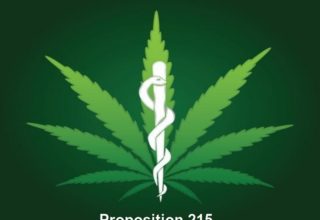
1996 - Proposition 215
California voters pass Proposition 215, legalizing medical marijuana in the state. Arizona voters pass a ballot initiative legalizing medical marijuana. However, the initiative is found to be invalid because of its wording related to marijuana prescriptions, which remained illegal under federal law.
Milestone -
1998
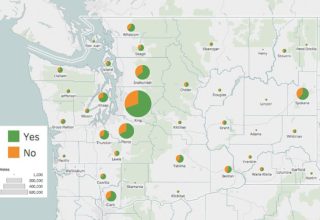
1998 - Measure 8 | Initiative 59, 692
Alaska voters pass Measure 8, to allow medical use of marijuana. District of Columbia (D.C.) voters pass Ballot Initiative 59, which permitted patients who were seriously ill to use medical marijuana when recommended by a licensed physician. However, the U.S. Congress voted to prevent the initiative from being enacted. Oregon passes the Oregon Medical Marijuana Act. Washington voters pass Initiative 692, legalizing medical marijuana.
Milestone -
1999

1999 - SB 94 | Question 2
Alaska legislature passes SB 94. It passed with a 31-to-3 vote – and essentially merges the Medical Cannabis Regulation and Safety Act and Proposition 64, the Adult Use of Marijuana Act, into one regulatory framework that will govern both medical and recreational cannabis use. Also, Maine voters pass Question 2, a ballot initiative legalizing medical marijuana.
Milestone -
2000
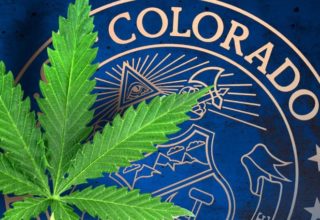
2000 - Amendment 20 | SB 862 | Question 9
Colorado voters pass Ballot Amendment 20, to allow the legal use of medical marijuana. Hawaii legislature passes SB862, legalizing the medical use of cannabis. Nevada voters pass Question 9, to amend the state’s constitution to allow medical marijuana.
Milestone -
2002

2002 - LD 611
Maine legislature passes LD 611, to create a nonprofit marijuana distribution center in the state.
Milestone -
2003
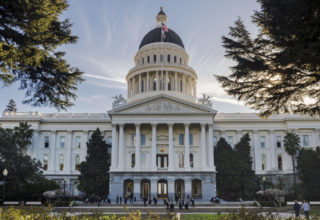
2003 - SB 420
California legislature passes SB 420, which prohibits physicians from being punished for recommending medical marijuana to patients.
Milestone -
2004
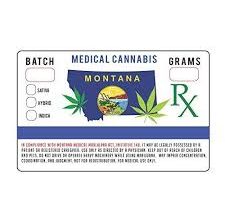
2004 - Initiative 148 | SB 76
Montana voters pass Initiative 148, allowing the legal use of medical marijuana for patients with debilitating conditions. Vermont legislature passes SB 76, which legalizes the use of medical marijuana for patients with specified serious illnesses.
Milestone -
2007

2007 - SB 523, 161, 791, 7
New Mexico legislature passes SB 523, legalizing medical marijuana for compassionate use. Oregon legislature passes SB 161, amending certain provisions and creating new provisions related to the use of medical marijuana in the state. Rhode Island’s General Assembly passes SB 791, to allow the legal use of medical marijuana for certain debilitating medical conditions. Vermont legislature passes SB 7, expanding the use of medical marijuana to more conditions.
Milestone -
2008

2008 - Proposal 1
Michigan voters pass Proposal 1, which legalizes the medical use of marijuana in the state.
Milestone -
2009

2009 - Initiative 59 | Question 5 | Sb 119, 185
U.S. Congress reverses its blocking of the District of Columbia’s Initiative 59 that voters passed in 1998. The Obama administration issues a memo to federal prosecutors, encouraging them to refrain from prosecuting people who distribute medical marijuana in compliance with state laws. Maine voters pass the Question 5 ballot initiative to create nonprofit medical cannabis dispensaries and to establish a statewide system for identification cards to protect patients who use medical marijuana from being arrested. New Jersey legislature passes SB 119, legalizing medical marijuana. Rhode Island General Assembly passes SB 185, amending its medical marijuana laws to establish compassion centers for the distribution of medical marijuana.
Milestone -
2010

2010 - Proposition 203 | L18-2010 | LD 1811 | Sb 5798
Arizona voters pass Proposition 203, legalizing medical marijuana. District of Columba council passes L18-2010, legalizing medical marijuana. Maine legislature passes LD 1811, amending the state’s medical marijuana laws, among other things, to establish a medical advisory board for adding new conditions for which medical marijuana could legally be used. Washington state legislature passes SB 5798, to allow authorized healthcare professionals other than physicians to recommend medical marijuana for patients.
Milestone -
2011

2011 - SB 217, 423, 17, 5073
Delaware General Assembly passes SB 217, legalizing medical marijuana. Montana legislature passes SB 423, expanding the state’s medical marijuana laws. Vermont legislature passes SB 17, registering nonprofit organizations for distributing medical marijuana. Washington state legislature passes SB 5073, further relaxing limitations on its medical marijuana laws.
Milestone -
2012
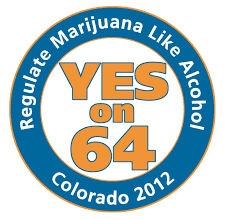
2012 - Amendment 64 | Question 3 | Initiative 502
Colorado voters pass Amendment 64, legalizing the use of recreational marijuana. Massachusetts voters pass the Question 3 ballot initiative, allowing the legal use of medical marijuana. Washington state voters approve Initiative 502, legalizing recreational marijuana.
Milestone -
2013

2013 - Cole Memo | HB 1, 573
The Obama administration issues the “Cole memo” to federal prosecutors to limit intervention in states that have legalized marijuana. Illinois legislature passes HB 1, to allow the compassionate use of medical marijuana. New Hampshire legislature passes HB 573, legalizing the use of medical cannabis.
Milestone -
2014

2014 - Measure 2, 91 | Initiative 71 | SF 2470 | A6357
Alaska voters pass Ballot Measure 2, legalizing recreational marijuana. District of Columbia voters pass Initiative 71, legalizing recreational marijuana. Minnesota legislature passes SF 2470, allowing the legal use of medical marijuana. New York state assembly passes A6357, legalizing medical marijuana. Oregon voters pass Measure 91, legalizing recreational marijuana.
Milestone -
2016
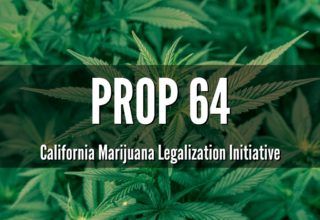
2016 - Issue 6 | Proposition 64 | Amendment 2 | Question 4, 2 | Measure 5 | HB 523 | SB 3
Arkansas voters pass Issue 6 to amend the state constitution to legalize medical marijuana. California voters pass Proposition 64, legalizing recreational marijuana. Florida voters pass Amendment 2, legalizing medical marijuana. Massachusetts voters pass the Question 4 ballot initiative, legalizing recreational marijuana. Nevada voters pass the Question 2 ballot initiative, legalizing recreational marijuana. North Dakota voters pass Measure 5, legalizing medical marijuana. Ohio legislature passes HB 523, legalizing medical marijuana. Pennsylvania legislature passes SB 3, legalizing medical marijuana.
Milestone -
2017

2017 - SB 386
West Virginia legislature passes SB 386, legalizing medical marijuana.
Milestone -
2018

2018 - Cole Memo Rescinded | Question 788 | H. 511 | Amendment 2 | Proposition 2
U.S. Attorney General Jeff Sessions rescinds the Cole memo and other Obama administration policies related to enforcement of federal marijuana laws in states that have legalized marijuana. Oklahoma voters pass Question 788 to legalize medical marijuana. Vermont legislature passes H. 511 bill, to allow the legal use of recreational marijuana in limited quantities. Missouri voters pass Amendment 2 to legalize medical marijuana. Utah voters pass Proposition 2 to legalize medical marijuana.
Milestone
-
1996

1996 - Proposition 215
California voters pass Proposition 215, legalizing medical marijuana in the state. Arizona voters pass a ballot initiative legalizing medical marijuana. However, the initiative is found to be invalid because of its wording related to marijuana prescriptions, which remained illegal under federal law.
Milestone -
1998

1998 - Measure 8 | Initiative 59, 692
Alaska voters pass Measure 8, to allow medical use of marijuana. District of Columbia (D.C.) voters pass Ballot Initiative 59, which permitted patients who were seriously ill to use medical marijuana when recommended by a licensed physician. However, the U.S. Congress voted to prevent the initiative from being enacted. Oregon passes the Oregon Medical Marijuana Act. Washington voters pass Initiative 692, legalizing medical marijuana.
Milestone -
1999

1999 - SB 94 | Question 2
Alaska legislature passes SB 94. It passed with a 31-to-3 vote – and essentially merges the Medical Cannabis Regulation and Safety Act and Proposition 64, the Adult Use of Marijuana Act, into one regulatory framework that will govern both medical and recreational cannabis use. Also, Maine voters pass Question 2, a ballot initiative legalizing medical marijuana.
Milestone -
2000

2000 - Amendment 20 | SB 862 | Question 9
Colorado voters pass Ballot Amendment 20, to allow the legal use of medical marijuana. Hawaii legislature passes SB862, legalizing the medical use of cannabis. Nevada voters pass Question 9, to amend the state’s constitution to allow medical marijuana.
Milestone -
2002

2002 - LD 611
Maine legislature passes LD 611, to create a nonprofit marijuana distribution center in the state.
Milestone -
2003

2003 - SB 420
California legislature passes SB 420, which prohibits physicians from being punished for recommending medical marijuana to patients.
Milestone -
2004

2004 - Initiative 148 | SB 76
Montana voters pass Initiative 148, allowing the legal use of medical marijuana for patients with debilitating conditions. Vermont legislature passes SB 76, which legalizes the use of medical marijuana for patients with specified serious illnesses.
Milestone -
2007

2007 - SB 523, 161, 791, 7
New Mexico legislature passes SB 523, legalizing medical marijuana for compassionate use. Oregon legislature passes SB 161, amending certain provisions and creating new provisions related to the use of medical marijuana in the state. Rhode Island’s General Assembly passes SB 791, to allow the legal use of medical marijuana for certain debilitating medical conditions. Vermont legislature passes SB 7, expanding the use of medical marijuana to more conditions.
Milestone -
2008

2008 - Proposal 1
Michigan voters pass Proposal 1, which legalizes the medical use of marijuana in the state.
Milestone -
2009

2009 - Initiative 59 | Question 5 | Sb 119, 185
U.S. Congress reverses its blocking of the District of Columbia’s Initiative 59 that voters passed in 1998. The Obama administration issues a memo to federal prosecutors, encouraging them to refrain from prosecuting people who distribute medical marijuana in compliance with state laws. Maine voters pass the Question 5 ballot initiative to create nonprofit medical cannabis dispensaries and to establish a statewide system for identification cards to protect patients who use medical marijuana from being arrested. New Jersey legislature passes SB 119, legalizing medical marijuana. Rhode Island General Assembly passes SB 185, amending its medical marijuana laws to establish compassion centers for the distribution of medical marijuana.
Milestone -
2010

2010 - Proposition 203 | L18-2010 | LD 1811 | Sb 5798
Arizona voters pass Proposition 203, legalizing medical marijuana. District of Columba council passes L18-2010, legalizing medical marijuana. Maine legislature passes LD 1811, amending the state’s medical marijuana laws, among other things, to establish a medical advisory board for adding new conditions for which medical marijuana could legally be used. Washington state legislature passes SB 5798, to allow authorized healthcare professionals other than physicians to recommend medical marijuana for patients.
Milestone -
2011

2011 - SB 217, 423, 17, 5073
Delaware General Assembly passes SB 217, legalizing medical marijuana. Montana legislature passes SB 423, expanding the state’s medical marijuana laws. Vermont legislature passes SB 17, registering nonprofit organizations for distributing medical marijuana. Washington state legislature passes SB 5073, further relaxing limitations on its medical marijuana laws.
Milestone -
2012

2012 - Amendment 64 | Question 3 | Initiative 502
Colorado voters pass Amendment 64, legalizing the use of recreational marijuana. Massachusetts voters pass the Question 3 ballot initiative, allowing the legal use of medical marijuana. Washington state voters approve Initiative 502, legalizing recreational marijuana.
Milestone -
2013

2013 - Cole Memo | HB 1, 573
The Obama administration issues the “Cole memo” to federal prosecutors to limit intervention in states that have legalized marijuana. Illinois legislature passes HB 1, to allow the compassionate use of medical marijuana. New Hampshire legislature passes HB 573, legalizing the use of medical cannabis.
Milestone -
2014

2014 - Measure 2, 91 | Initiative 71 | SF 2470 | A6357
Alaska voters pass Ballot Measure 2, legalizing recreational marijuana. District of Columbia voters pass Initiative 71, legalizing recreational marijuana. Minnesota legislature passes SF 2470, allowing the legal use of medical marijuana. New York state assembly passes A6357, legalizing medical marijuana. Oregon voters pass Measure 91, legalizing recreational marijuana.
Milestone -
2016

2016 - Issue 6 | Proposition 64 | Amendment 2 | Question 4, 2 | Measure 5 | HB 523 | SB 3
Arkansas voters pass Issue 6 to amend the state constitution to legalize medical marijuana. California voters pass Proposition 64, legalizing recreational marijuana. Florida voters pass Amendment 2, legalizing medical marijuana. Massachusetts voters pass the Question 4 ballot initiative, legalizing recreational marijuana. Nevada voters pass the Question 2 ballot initiative, legalizing recreational marijuana. North Dakota voters pass Measure 5, legalizing medical marijuana. Ohio legislature passes HB 523, legalizing medical marijuana. Pennsylvania legislature passes SB 3, legalizing medical marijuana.
Milestone -
2017

2017 - SB 386
West Virginia legislature passes SB 386, legalizing medical marijuana.
Milestone -
2018

2018 - Cole Memo Rescinded | Question 788 | H. 511 | Amendment 2 | Proposition 2
U.S. Attorney General Jeff Sessions rescinds the Cole memo and other Obama administration policies related to enforcement of federal marijuana laws in states that have legalized marijuana. Oklahoma voters pass Question 788 to legalize medical marijuana. Vermont legislature passes H. 511 bill, to allow the legal use of recreational marijuana in limited quantities. Missouri voters pass Amendment 2 to legalize medical marijuana. Utah voters pass Proposition 2 to legalize medical marijuana.
Milestone
MOST SIGNIFICANT LAWS PASSED
Much has happened in recent years to promote the legal use of marijuana for either medical or recreational purposes. But these five laws stand out because of their extraordinary impact.
California's Proposition 215 (1996)
California became the first state to legalize medical marijuana. This trailblazing victory gave many other organizers the confidence to push for the legalization of marijuana in their states.
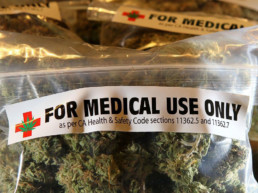

Colorado's Amendment 64 (2012)
Colorado became one of the first two states to legalize the recreational use and sale of marijuana. The state also set the standard on how to effectively regulate recreational cannabis, with both medical and recreational sales totaling approximately $1.5 billion in 2017.
MOST SIGNIFICANT LAWS PASSED
Much has happened in recent years to promote the legal use of marijuana for either medical or recreational purposes. But these five laws stand out because of their extraordinary impact.

California's Proposition 215 (1996)
California became the first state to legalize medical marijuana. This trailblazing victory gave many other organizers the confidence to push for the legalization of marijuana in their states.

Colorado's Amendment 64 (2012)
Colorado became one of the first two states to legalize the recreational use and sale of marijuana. The state also set the standard on how to effectively regulate recreational cannabis, with both medical and recreational sales totaling approximately $1.5 billion in 2017.
Washington's Initiative 502 (2012)
Washington was the second of the two states to vote for the legalization of recreational marijuana. Although Washington's cannabis market is slightly smaller than Colorado's market, the total marijuana spending for 2017 was still $934 million.


Washington's Initiative 502 (2012)
Washington was the second of the two states to vote for the legalization of recreational marijuana. Although Washington's cannabis market is slightly smaller than Colorado's market, the total marijuana spending for 2017 was still $934 million.
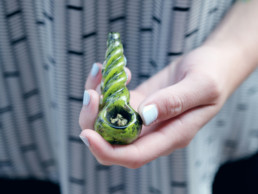
California's Proposition 64 (2016)
California voters pass a ballot initiative to legalize recreational marijuana, which is significant due to the state's size. Their medical marijuana market was nearly $3 billion in 2017, roughly twice the size of Colorado's total marijuana market. According to BDS Analytics' projections, California's total marijuana market could reach $5.1 billion by 2019.

California's Proposition 64 (2016)
California voters pass a ballot initiative to legalize recreational marijuana, which is significant due to the state's size. Their medical marijuana market was nearly $3 billion in 2017, roughly twice the size of Colorado's total marijuana market. According to BDS Analytics' projections, California's total marijuana market could reach $5.1 billion by 2019.
Vermont's H. 511 (2018)
Vermont is the first state to legalize recreational marijuana through the state legislature rather than a ballot initiative. The new law allows for up to an ounce of marijuana for recreational use. However, the sale of recreational marijuana is still prohibited.


Vermont's H. 511 (2018)
Vermont is the first state to legalize recreational marijuana through the state legislature rather than a ballot initiative. The new law allows for up to an ounce of marijuana for recreational use. However, the sale of recreational marijuana is still prohibited.
WeedHumor Home
OUR COMMUNITY
2012
Inception Date
6K +
Funny Meme Posts
420M
LAUGHS(ok, not actually)
7M +
Active Members
We are professionals, working people, artists, musicians, athletes, teachers and students — who use cannabis for medical, spiritual, social, and other personal purposes. We have good relationships with our families, contribute to our communities, pay taxes, and are otherwise law-abiding citizens.
We are the modern cannabis user.
OUR COMMUNITY
2012
Inception Date
6K +
Funny Meme Posts
420M
LAUGHS(ok, not actually)
7M +
Active Members
We are professionals, working people, artists, musicians, athletes, teachers and students — who use cannabis for medical, spiritual, social, and other personal purposes. We have good relationships with our families, contribute to our communities, pay taxes, and are otherwise law-abiding citizens.
We are the modern cannabis user.
ABOUT WEED HUMOR
Since 2012, we've been remixing, parodying, and captioning popular images and videos to create humorous, cannabis related memes. But aside from making people laugh, they express ideas, frame problems, share user experiences and deal with important social, political, and cultural issues surrounding marijuana use in our society.
Much of our content is created and submitted by members of our Instagram and Facebook communities (@weedhumor and @marijuana). Collectively, they represent a large portion of marijuana consumers (over 7 million) mostly in North America. In this respect, we have become an unobstructed and uncensored voice for modern cannabis users, the culture, and their perspective.


WE BELIEVE
We believe people should be able to do things they enjoy as long as they don't harm other people. So we support legalization—with appropriate legislation and regulation—to give people safe access to clean product, structure for ethical business practices, and guidelines for safe and responsible use.
We support continued research on the many health benefits of cannabinoids. We believe education is the key to broadening public perception and hopefully one day, eliminating the stigma associated with the Cannabis Industry.
In the words of Margaret Wheatley: "We believe there is no power for change greater than a community discovering what it cares about."

ABOUT WEED HUMOR
Since 2012, we've been remixing, parodying, and captioning popular images and videos to create humorous, cannabis related memes. But aside from making people laugh, they express ideas, frame problems, share user experiences and deal with important social, political, and cultural issues surrounding marijuana use in our society.
Much of our content is created and submitted by members of our Instagram and Facebook communities (@weedhumor and @marijuana). Collectively, they represent a large portion of marijuana consumers (over 7 million) mostly in North America. In this respect, we have become an unobstructed and uncensored voice for modern cannabis users, the culture, and their perspective.

WE BELIEVE
We believe people should be able to do things they enjoy as long as they don't harm other people. So we support legalization—with appropriate legislation and regulation—to give people safe access to clean product, structure for ethical business practices, and guidelines for safe and responsible use.
We support continued research on the many health benefits of cannabinoids. We believe education is the key to broadening public perception and hopefully one day, eliminating the stigma associated with the Cannabis Industry.
In the words of Margaret Wheatley: "We believe there is no power for change greater than a community discovering what it cares about."
OUR BUSINESS
Cannabis marketing and advertising isn’t easy. Brands face significant existential challenges in trying to promote their products. Google, Facebook and the other tech giants seem to be confused on how to properly classify cannabis. Because of this confusion, there are a number of ad restrictions and things you can’t publish organically without the risk of your business account getting shut down — and without warning.
We have a solution. ⇓
Influencer Marketing & Cannabis Ad Agency
Access the largest cannabis social media following in the world to advertise your cannabis products. We use our knowledge and experience with cannabis marketing to develop your brand and content, communicate your message, and reach your target audience without the risk of being shut down.
Cannabis Influencer Marketing
Celebrity Relations
Viral Content Production
Public Relations (PR) Marketing
Social Media Campaigns
Impressions & Brand Awareness
Cannabis Programatic & Paid Marketing
Cannabis Marketing Events
Talent Development

OUR BUSINESS
Cannabis marketing and advertising isn’t easy. Brands face significant existential challenges in trying to promote their products. Google, Facebook and the other tech giants seem to be confused on how to properly classify cannabis. Because of this confusion, there are a number of ad restrictions and things you can’t publish organically without the risk of your business account getting shut down—and without warning.
We have a solution. ⇓
Influencer Marketing & Cannabis Ad Agency
Access the largest cannabis social media following in the world to advertise your cannabis products. We use our knowledge and experience with cannabis marketing to develop your brand and content, communicate your message, and reach your target audience without the risk of being shut down.
Cannabis Influencer Marketing
Celebrity Relations
Viral Content Production
Public Relations (PR) Marketing
Social Media Campaigns
Impressions & Brand Awareness
Cannabis Paid Marketing
Cannabis Marketing Events
Talent Development
SPECIAL OFFERS!
Signing up gives you access to special offers and makes you eligible to enter our MONTHLY SWEEPSTAKES CONTESTS! We're giving away cool cannabis related products, t-shirts, hats, and more! Don't miss out ;-)
OUR CONTRIBUTION
Unquestionably, the heart of the cannabis legalization movement is medical marijuana. Our compassion for the most vulnerable communities is one of the most powerful forces behind reform. That's why Weed Humor (through its parent organization) donates regularly to groups and organizations who advocate for legalization and continue the important research on medicinal cannabis.
There are two types of marijuana legalization: the legalization of medicinal cannabis and the legalization of marijuana for recreational use.
Currently, there are over 200 different conditions that show improvement with cannabis use for a wide range of patients. Also, find out how to obtain a medicinal cannabis card in your state.
OUR CONTRIBUTION
Unquestionably, the heart of the cannabis legalization movement is medical marijuana. Our compassion for the most vulnerable communities is one of the most powerful forces behind reform. That's why Weed Humor (through its parent organization) donates regularly to groups and organizations who advocate for legalization and continue the important research on medicinal cannabis.

There are two types of marijuana legalization: the legalization of medicinal cannabis and the legalization of marijuana for recreational use.
Currently, there are over 200 different conditions that show improvement with cannabis use for a wide range of patients. Also, find out how to obtain a medicinal cannabis card in your state.
Creative Landing
Modular Design
Truly one of the most powerful and advanced grid. Truly one of the most powerful and advanced grid.
Mobile Ready
Uncode comes with pixel perfect & clean design to satisfy any possible an impossible needs
Top Performance
Automatically adapt and set your images sizes for best quality on all devices and resolutions.
Elite Support
A perfect responsive theme powered with selective options for different screen and monitors.
Request early access
Try our new application trial today and you get 14 days for free!
March 25, 2017
Calm over the horizon
Many years ago, I worked for my parents who own a video production company. Because it is a family business, you inevitably end up wearing…
March 22, 2017
Inspired by clouds
Last year I wrote about why booking too far in advance can be dangerous for your business, and this concept of margin so eloquently…
Creative Director
About me
Experience and beautiful aesthetics.
I have worked with a number of clients, both through agencies and independently. I have worked with a number of clients, both through agencies and independently.
Sometimes, I am fortunate enough to win some awards & recognition.
18
Awards
22
Speeches
64
Articles
125
Projects
From the blog
Articles & News
My publications and articles about UI/UX Design. A digression in my design workflow & methodologies.
March 25, 2017
Calm over the horizon
Many years ago, I worked for my parents who own a video production company.…
March 22, 2017
Inspired by clouds
Last year I wrote about why booking too far in advance can be dangerous for…
March 20, 2017
Make it clean and simple
Just the other day I happened to wake up early. That is unusual for an…
Creative Digital Agency
About
We develop digital strategies, products and services.
Uncode is a creative marketing agency that specializes in strategy, creativity, design and innovative technology.
DEVELOPMENT
DESIGN
EDITING
STRATEGY
Journal
March 25, 2017
Calm over the horizon
Many years ago, I worked for my parents who own a video production company. Because it is a family business, you…
March 22, 2017
Inspired by clouds
Last year I wrote about why booking too far in advance can be dangerous for your business, and this concept of margin…
March 20, 2017
Make it clean and simple
Just the other day I happened to wake up early. That is unusual for an engineering student. After a long time I could…
Contact
Talk to us about new work
Our core clients are from the Europe countries, but we are happy to work with clients from all over the globe.
Creative Corporation
About
The Uncode Corporation showcases 100 of the most innovative solutions from every corner of the globe that are working to create a cleaner future and deliver on the Sustainable Development Goals.
By systematically working with the global sustainability community to uncover and assess innovative projects, Sustainia has, over the last ve years, built a comprehensive database of more than 4,500 sustainable solutions from all over the world. Our external advisory board, this year consisting of 24 experts from 20 leading global research organiza- tions, plays a crucial role in assisting us in vetting solutions to ensure that our ve evaluation criteria are upheld.
85%
Today, the global economy generates 85% more economic value with one metric ton of raw materials compared to the 1980s and the global middle class is projected to grow to 5 billion people by 2030, greener future on the Sustainable Development Goals.
" About 2.6 billion people in developing countries face di culties accessing electricity, while about 800 million lack access to water. In many African countries, these infrastructure constraints reduce productivity by 40%. "
— Carlton Sparks, Executive Officer
Facts
Swedish property company Vasakronan issued the world’s rst corporate green bond, and is nancing investments to develop low-impact, climate-friendly building projects, issued the world’s first corporate green bond, raising $160 million.
Hot water in many commercial facilities is normally supplied via central boilers powered by fossil fuels, while air cooling is supplied by electric chillers. By us- ing a self-contained water heat pump, Energy takes unused thermal energy from existing air-conditioning systems and transfers it to the boilers’ circuit. This new and efficient thermal energy can then be used in showers, pools, and kitchens.
Sectors
With an adaptive green approach, Uncode Corporation transformed one of America’s oldest market into energy. We are a production company with love for sustainability and save energeticas.
Partners
Uncode Corporation partners with vendors all around the world and cities to build and operate local greenhouses that cut time, distance, and costs in the market supply chain. Today, the global economy generates 85% more economic value.
Our external advisory board, this year consisting of 24 experts from 20 leading global research organiza- tions, plays a crucial role in assisting us in vetting solutions to ensure that our ve evaluation criteria are upheld. By us- ing a self-contained water heat pump, Energy takes unused thermal energy from existing air-conditioning systems and transfers it to the boilers’ circuit. This new and efficient thermal energy can then be used in showers, pools, and kitchens.
" Man has gone out to explore other worlds and other civilizations without having explored his own labyrinth of dark passages and secret chambers, and without finding what lies behind doorways that he himself has sealed. "
— Carlton Sparks, Executive Officer
Investors
The annual Uncode publication showcases 100 of the most innovative solutions from every corner of the globe that are working to create a cleaner, greener future and deliver on the Sustainable Development Goals.
News
March 25, 2017
Calm over the horizon
Many years ago, I worked for my parents who own a video production company. Because it is a family business, you inevitably end up wearing many hats and being the czar of many different jobs. I mainly managed projects and worked as a video editor. On…
March 22, 2017
Inspired by clouds
Last year I wrote about why booking too far in advance can be dangerous for your business, and this concept of margin so eloquently captures what I had recognized had been my problem: I was so booked up with clients that I wasn’t leaving any margin for error,…
Contact
Contact us for support, media, or general inquiries.
Our administration office will be happy to contact you about advanced inquiries and to address you to our expert office:
Creative Department
Our team
64+
Projects
22
Members
125+
Posts
18
Awards
We are an agency that focuses on digital design solutions. We outline, design and develop online media and applications for brands and companies.
Our works
Corporate websites, online shops, campaigns or apps. We have all the expertise required to make a digital product a successful product.
Our blog
Awwwards best websites
I was recently quoted as saying, I don't care if Instagram has more users than Twitter. If you…
January 8, 2017
Working from your home?
Just the other day I happened to wake up early. That is unusual for an engineering student.…
January 14, 2017
Some amazing buildings
When you are alone for days or weeks at a time, you eventually become drawn to people. Talking…
January 18, 2017
Creative Designers
Some
News.
Inspired by clouds
Last year I wrote about why booking too far in advance can be dangerous for your business, and this concept of margin so eloquently captures what I had…
Calm over the horizon
Many years ago, I worked for my parents who own a video production company. Because it is a family business, you inevitably end up wearing many hats and being…
Make it clean and simple
Just the other day I happened to wake up early. That is unusual for an engineering student. After a long time I could witness the sunrise. I could feel the sun…
12
Awards
78
Portfolio Projects
22
Happy Clients
Creative Studio
We love what we do.
Digital agency.
We design products, packaging and user experiences with a unique research-based process i call Informed Creativity. Our work has been recognised with multiple international awards and widely covered in the press.
Awesome stuff.
Advanced Grid
Truly one of the most powerful and advanced grid system with equal-height columns.
Digital Branding
Uncode comes with pixel perfect & clean design to satisfy any possible an impossible needs.
Top Performance
Automatically adapt and set your images for best quality on all devices and resolutions.
Responsive Design
A perfect responsive theme powered with selective options for different screen resolutions.
You have to learn the rules of the game. And then you have to play better than anyone else.Albert Einstein
You have to learn the rules of the game. And then you have to play better than anyone else.Albert Einstein
You have to learn the rules of the game. And then you have to play better than anyone else.Albert Einstein
525
Layouts
23
Awards
745
Cups of Coffee
78
Projects
“Dream big, work hard and surround yourself with love.”
Fresh news.
Calm over the horizon
Many years ago, I worked for my parents who own a video production company. Because it is a family business, you…
Real time design tools
Just the other day I happened to wake up early. That is unusual for an engineering student. After a long time I could…
My tech travel setup
One of the easiest ways to improve travel photos is shooting in better light, and the best light is often in the hour…
Inspired by clouds
Last year I wrote about why booking too far in advance can be dangerous for your business, and this concept of margin…
When you are alone
When you are alone for days or weeks at a time, you eventually become drawn to people. Talking to randos is the norm.…
Time is passing by
Every selector has the potential to have unintended side effects by targeting unwanted elements or clashing with other…
Me Myself and I
Many years ago, I worked for my parents who own a video production company. Because it is a family business, you…
Learn the rules first
I was recently quoted as saying, I don't care if Instagram has more users than Twitter. If you read the article you’ll…








































